Related Research Articles
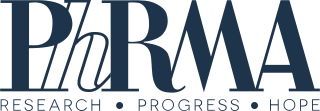
Pharmaceutical Research and Manufacturers of America, formerly known as the Pharmaceutical Manufacturers Association, is a trade group representing companies in the pharmaceutical industry in the United States. Founded in 1958, PhRMA lobbies on behalf of pharmaceutical companies. PhRMA is headquartered in Washington, D.C.
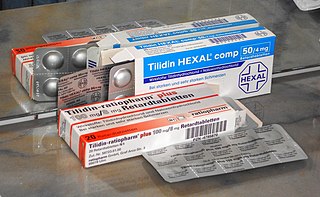
A medication is a drug used to diagnose, cure, treat, or prevent disease. Drug therapy (pharmacotherapy) is an important part of the medical field and relies on the science of pharmacology for continual advancement and on pharmacy for appropriate management.
Prescription drug list prices in the United States continually are among the highest in the world. The high cost of prescription drugs became a major topic of discussion in the 21st century, leading up to the American health care reform debate of 2009, and received renewed attention in 2015. One major reason for high prescription drug prices in the United States relative to other countries is the inability of government-granted monopolies in the American health care sector to use their bargaining power to negotiate lower prices, and the American payer ends up subsidizing the world's R&D spending on drugs.
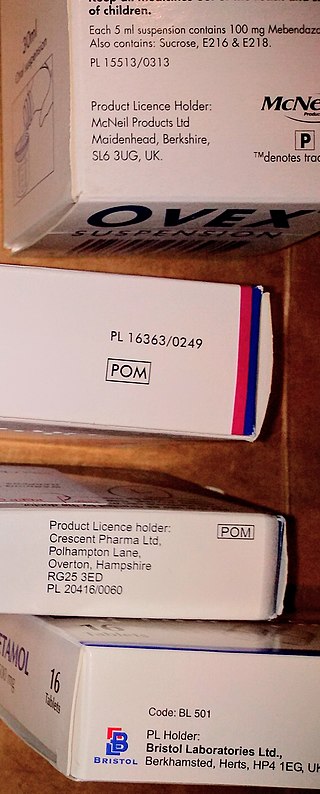
A prescription drug is a pharmaceutical drug that is permitted to be dispensed only to those with a medical prescription. In contrast, over-the-counter drugs can be obtained without a prescription. The reason for this difference in substance control is the potential scope of misuse, from drug abuse to practicing medicine without a license and without sufficient education. Different jurisdictions have different definitions of what constitutes a prescription drug.
Ranbaxy Laboratories Limited was an Indian multinational pharmaceutical company that was incorporated in India in 1961 and remained an entity until 2014. The company went public in 1973. Ownership of Ranbaxy changed twice over the course of its history.

AstraZeneca plc (AZ) is a British-Swedish multinational pharmaceutical and biotechnology company with its headquarters at the Cambridge Biomedical Campus in Cambridge, England. It has a portfolio of products for major diseases in areas including oncology, cardiovascular, gastrointestinal, infection, neuroscience, respiratory, and inflammation. It was involved in developing the Oxford–AstraZeneca COVID-19 vaccine.
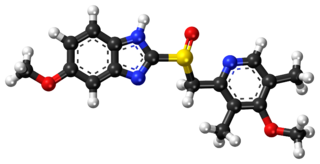
Esomeprazole, sold under the brand name Nexium [or Neksium] among others, is a medication which reduces stomach acid. It is used to treat gastroesophageal reflux disease, peptic ulcer disease, and Zollinger–Ellison syndrome. Its effectiveness is similar to that of other proton pump inhibitors (PPIs). It is taken by mouth or injection into a vein.

Dilip Shanghvi is an Indian billionaire businessman. As the founder of Sun Pharmaceuticals, he is one of the country's richest people. The Government of India awarded him the civilian honor of the Padma Shri in 2016. India Today magazine ranked him 8th in India's most powerful people of 2017 list.

Parke-Davis is a subsidiary of the pharmaceutical company Pfizer. Although Parke, Davis & Co. is no longer an independent corporation, it was once America's oldest and largest drug maker, and played an important role in medical history. In 1970 Parke-Davis was acquired by Warner–Lambert, which in turn was acquired by Pfizer in 2000.
Dr. Reddy's Laboratories is an Indian multinational pharmaceutical company based in Hyderabad. The company was founded by Kallam Anji Reddy, who previously worked in the mentor institute Indian Drugs and Pharmaceuticals Limited. Dr. Reddy manufactures and markets a wide range of pharmaceuticals in India and overseas. The company produces over 190 medications, 60 active pharmaceutical ingredients (APIs) for drug manufacture, diagnostic kits, critical care, and biotechnology.

Secobarbital, sold under the brand name Seconal among others, is a short-acting barbiturate drug originally used for the treatment of insomnia. It was patented by Eli Lilly and Company in 1934 in the United States. It possesses anesthetic, anticonvulsant, anxiolytic, sedative, and hypnotic properties. In the United Kingdom, it was known as quinalbarbitone. Secobarbital is considered to be an obsolete sedative-hypnotic and has largely been replaced by the benzodiazepine family. It was widely abused, known on the street as "red devils" or "reds." Among barbiturates, secobarbital carries a particularly high risk of abuse and addiction, which is largely responsible for it falling out of use.
The pharmaceutical industry is one of the leading industries in the People's Republic of China, covering synthetic chemicals and drugs, prepared Chinese medicines, medical devices, apparatus and instruments, hygiene materials, packing materials, and pharmaceutical machinery. China has the second-largest pharmaceutical market in the world as of 2017 which is worth US$110 billion. China accounts for 20% of the world's population but only a small fraction of the global drug market. China's changing health-care environment is designed to extend basic health insurance to a larger portion of the population and give individuals greater access to products and services. Following the period of change, the pharmaceutical industry is expected to continue its expansion.

Olmesartan, sold under the brand name Benicar among others, is a medication used to treat high blood pressure (hypertension). It is taken orally. Versions are available as the combination olmesartan/hydrochlorothiazide and olmesartan/amlodipine. It is available as a prodrug, olmesartan medoxomil.
An essential medicines policy is one that aims at ensuring that people get good quality drugs at the lowest possible price, and that doctors prescribe the minimum of required drugs in order to treat the patient's illness. The pioneers in this field were Sri Lanka and Chile.
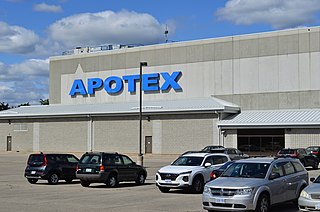
Apotex Inc. is a Canadian pharmaceutical corporation. Founded in 1974 by Barry Sherman, the company is the largest producer of generic drugs in Canada, with annual sales exceeding CA$2.5 billion. By 2023, Apotex employed close to 8,000 people as Canada's largest drug manufacturer, with over 300 products selling in over 115 countries. Apotex manufactures and distributes generic medications for a range of diseases and health conditions that include cancer, diabetes, high cholesterol, glaucoma, infections and blood pressure.

Daiichi Sankyo Company, Limited is a global pharmaceutical company and the second-largest pharmaceutical company in Japan. It achieved JPY 1,278 billion in revenue in 2022. The company owns the American pharmaceutical company American Regent.
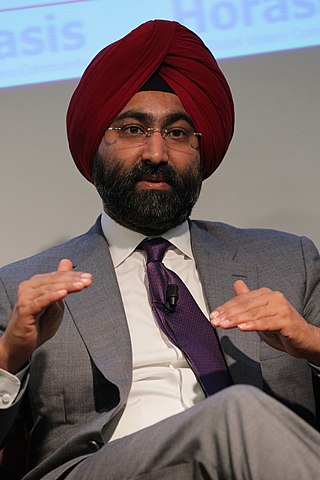
Malvinder Mohan Singh is a businessman who is now under arrest for criminal breach of trust. He, along with his brother Shivinder Mohan Singh, has many cases of fraud registered against him.
Nimotuzumab is a humanized monoclonal antibody that as of 2014 had orphan status in the US and EU for glioma, and marketing approval in India, China, and other countries for squamous cell carcinomas of the head and neck, and was undergoing several clinical trials.

Mirogabalin is a gabapentinoid medication developed by Daiichi Sankyo. Gabapentin and pregabalin are also members of this class. As a gabapentinoid, mirogabalin binds to the α2δ subunit of voltage-gated calcium channel, but with significantly higher potency than pregabalin. It has shown promising results in Phase II clinical trials for the treatment of diabetic peripheral neuropathic pain.
The pharmaceutical industry in Romania is prosperous, with an average revenue of 8.3 billion lei per year. Value chain in the pharmaceutical industry has increased significantly in the last decade in all segments, contributing with over 1% to GDP (2010). There are 22 plants of productions which receive subsidies from the state. The largest Romanian drugmaker is Terapia S.A., based in Cluj-Napoca. The biggest player in distribution of drugs, depending on turnover, is Mediplus. The company is part of A&D Pharma group, founded in 1994, which also controls the network of pharmacies Sensiblu. The logistics network of Mediplus consists of 10 regional warehouses and a national logistics center.
References
- ↑ "Terapia Official Website" . Retrieved March 19, 2021.
- ↑ Terapia - Mission statement
- ↑ Terapia Ranbaxy will manufacture high quality generic medicine
- ↑ Investment data on Terapia Archived May 23, 2012, at the Wayback Machine